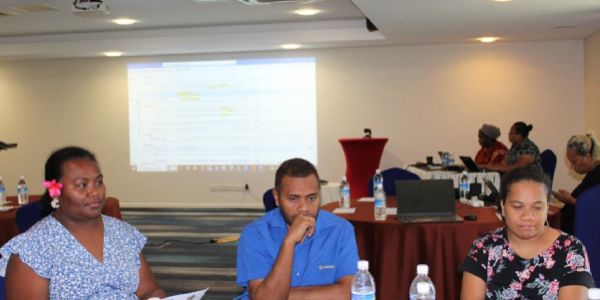MORE than 6,000 Solomon Islanders are working in Australia and New Zealand under the Pacific Australia Labour Mobility (PALM) and New Zealand’s Recognised Seasonal Employer (RSE) Scheme, whilst at least 15,000 are in the queue to join these seasonal labour schemes.
This was highlighted by the Director of External Trade in the Ministry of Foreign Affairs & External Trade Natalia Pattenot in her opening address at a Consultation on Pacific Regional Labour Mobility (PRLMS) in Honiara last week.
The consultation was facilitated by a visiting delegation from the Pacific Island Forum Secretariat (PIFS) office in Suva, Fiji. It brought together representatives of diplomatic missions, senior government officials, participants from the private sector and non-governmental organisations.
Joining the consultation virtually were representatives from PIFS and the International Organisation for Migration (IOM).
The Pacific Islands Forum Secretariat (PIFS) had been tasked by the Forum Trade Ministers in 2021 to undertake a comprehensive labour mobility assessment and one of the recommendations is to develop a Pacific Regional Labour Mobility Strategy (PRLMS).
Ms Pattenot acknowledged labour mobility as a significant agenda for Solomon Islands and its partner agencies as it continues to play a crucial role in driving economic development through remittances.
“With the recognition that labour mobility in the Pacific has increased over the years, the unilateral schemes provided by Australia and New Zealand continue to play a crucial role in driving economic development where remittances play a huge role in sustaining livelihoods and alleviating poverty and other socio-economic challenges.
“To date, more than 6,000 workers are directly engaging in labour mobility offshore in both Australia and New Zealand, whilst at least 15,000 people are in the que to join the pool of candidates seeking to participate in the Pacific Australia Labour Mobility (PALM) and Recognised Seasonal Employer (RSE) schemes.”
She also acknowledged labour mobility schemes as opportunities for Pacific Island workers to gain new skills and knowledge in the industries they are placed in the receiving countries that they can apply when they return to their home countries.
Ms Pattenot also seized the opportunity to emphasise that proposals for regional Labour Mobility should not duplicate other work being carried out in the Labour Mobility space and where existing mechanisms in place are working well to further enhance and improve the schemes.
She further acknowledged the pivotal role of the Pacific Islands Forum Trade Ministers Meetings which since 2019 made recommendations to strengthen strategic partnership between participating members and other key regional institutions, including the Pacific Islands Forum Secretariat.
Ms Pattenot expressed appreciation to all the stakeholders who were present at the consultation for their insightful contributions.
(MFAET/SOLSTAR)









